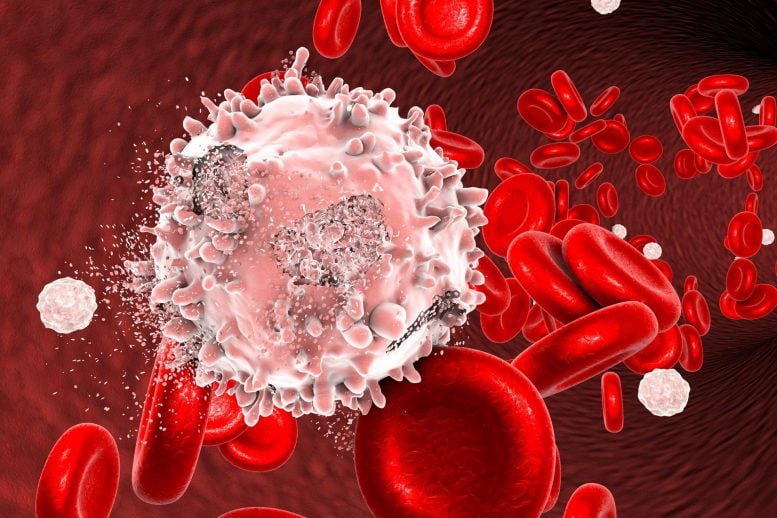
“Junk DNA” may hold the key to treating tough cancers. Existing drugs exploit weaknesses in cells with gene mutations.
Researchers at King’s College London have identified a promising strategy for treating certain blood cancers by repurposing existing drugs. Their approach involves targeting a part of human DNA once dismissed as irrelevant, revealing it to be a valuable therapeutic opportunity.
The findings, reported in Blood, examined myelodysplastic syndrome (MDS) and chronic lymphocytic leukemia (CLL). Both cancers frequently carry mutations in the ASXL1 and EZH2 genes, which normally regulate whether other genes are turned on or off. When these regulatory genes are altered, cells lose control over normal growth and division, leading to uncontrolled expansion of abnormal cells.
Limits of current treatments
Conventional cancer therapies often work by blocking harmful proteins produced by defective genes. In cases where the protein is absent altogether, as with these mutations, there is nothing for drugs to inhibit. This leaves patients with few effective treatment options and generally poorer outcomes.
Close to half of human DNA consists of repetitive sequences known as transposable elements (TEs), once thought to be nonfunctional “junk DNA.” The researchers discovered that in cancers carrying ASXL1 and EZH2 mutations, these TEs become abnormally active. Their heightened activity strains cancer cells and damages their DNA, exposing a vulnerability that could be exploited as a new form of therapy.
Repurposing PARP inhibitors
PARP inhibitors are drugs already used to treat some other cancers. They usually work by preventing cancer cells from repairing damaged DNA. In this study, they acted differently. When TEs move around in the genome, they cause breaks in the DNA that are however protected by PARP proteins for repair. Blocking PARP prevents this repair, causing damage to build up until the cancer cells die.
To confirm this new mechanism, the researchers used reverse transcriptase inhibitors, which stop TEs from copying themselves. This removed the effect of PARP inhibitors, showing that the drugs were working through a unique TE-related pathway rather than their usual role in BRCA-related cancers.
Wider impact for cancer therapy
“This discovery offers new hope for patients with hard-to-treat cancers, by using existing drugs in a completely new way, turning what was once thought to be useless DNA into a powerful target for treatment,” explains Professor Chi Wai Eric So, King’s College London.
While this research focused on the blood cancers MDS and CLL, the findings suggest that other cancers with similar gene mutations might also be vulnerable to this approach, potentially widening the use of PARP inhibitors in cancer treatment.
Reference: “Transposable elements as novel therapeutic targets for PARPi-induced synthetic lethality in PcG-mutated blood cancer” by Bernd B. Zeisig, Chiou-Tsun Tsai, Clemence Virely, Tsz Kan Fung, Ali Tuğrul Akin, Estelle Troadec, Bo Jiao, I. Richard Thompson, Priscilla Nga Ieng Lau, Nanjun Li, Andriani Charalambous, Larissa Bomfim, Jennifer Lynch, Athina Georgiou, Robbert Hoogeboom, Claire Lynn, Si-Yi Zhang, Piers E. M. Patten, Cynthia L. Fisher, Anna Schuh, Seishi Ogawa, Ghulam Mufti, Mohammad M. Karimi and Chi Wai Eric So, 11 September 2025, Blood.
DOI: 10.1182/blood.2025028560
Never miss a breakthrough: Join the SciTechDaily newsletter.